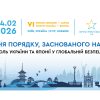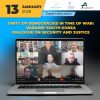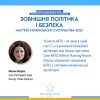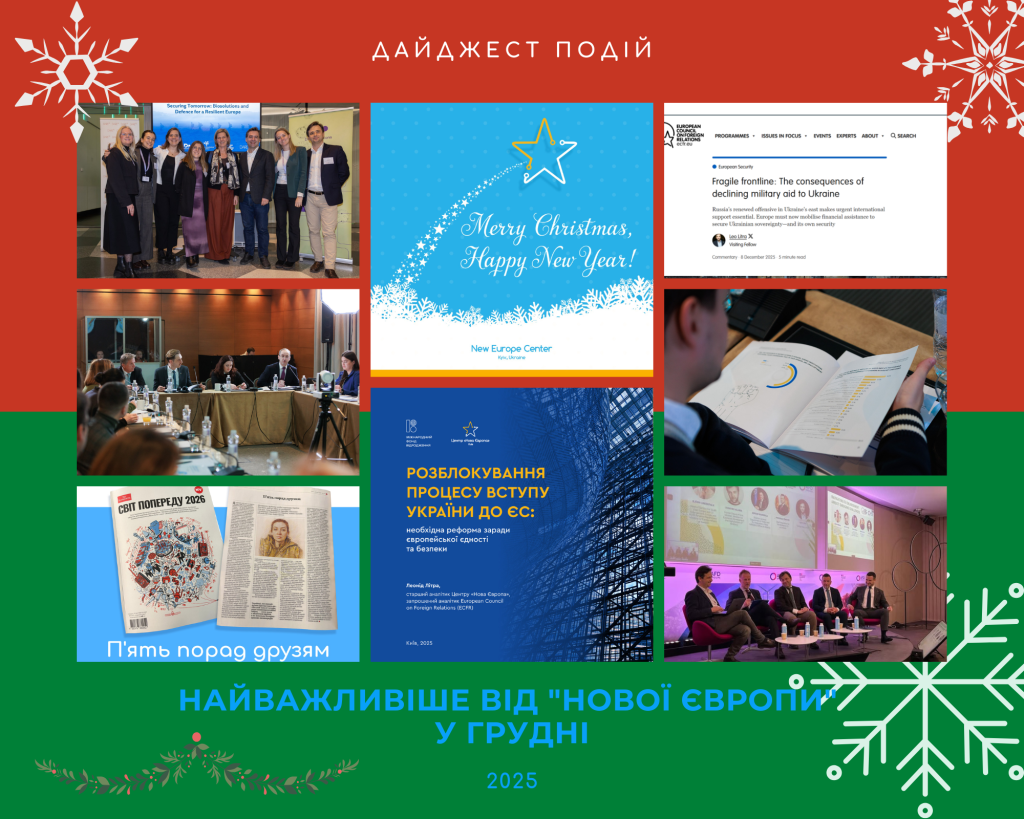On April 4, 2024, the New Europe Center together with Ifri – French Institute of International Relations held the III Ukraine-France Forum in Paris.
Please, find below the key messages of panelists of Session 2. Army, elites, society: can the “sacred union” be shattered?
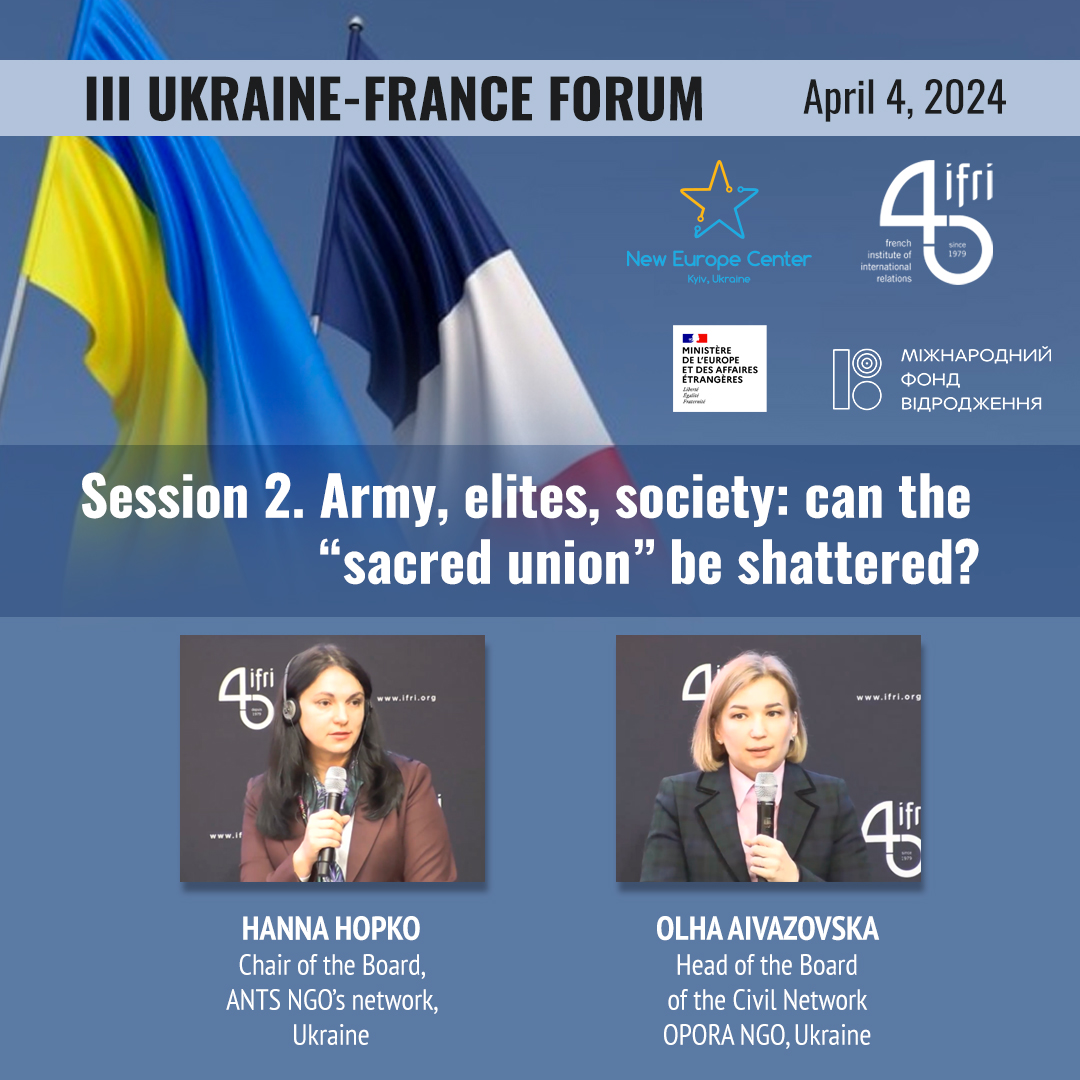
Hanna Hopko, Chair of the Board, ANTS NGO’s network, Ukraine:
Ukrainian society is more united now than ever. It’s all because we have a clear understanding that Russian aggression against Ukraine is genocide. Ukrainians clearly remember and say that this is the second genocide against Ukrainian people in the last 100 years. The first was committed by Stalin 90 years ago by means of Holodomor. Now it is Russian aggression with its war crimes, crimes against humanity, forced deportation of Ukrainian children, ecocide: according to the UN classification, what is genocide, this all corresponds to its definition.
Ukrainians are confident that they can win. And they must win, because if there is no victory, there will be occupation and the destruction of the nation. Therefore, this is what supports unity within Ukraine, despite the fact that President Zelenskyi does have a declining level of support. I really hope that conclusions will be drawn, because this is, in particular, an issue of effective communication with civil society, the issue of bilateral meetings between the president and the parliament, communication with representatives of the democratic opposition and specialists from various fields. That is, it is a dialogue that needs to be improved if we are talking about strengthening democracy in Ukraine.
As far as issue of corruption in Ukraine is concerned, almost every week we have a number of reports on the arrests of corrupt persons, either from the head of the Supreme Court or officials close to the President. We immediately see personnel resignations, but the real confirmation of the effectiveness of the fight against corruption will be the irreversibility of punishment and court sentences. And I really hope that we will see such examples in the nearest future.
Within Ukraine, we have created an effective network of anti-corruption institutions. From the National Anti-Corruption Bureau, the National Agency for the Prevention of Corruption to the Anti-Corruption High Court. But there is a question just now: a lot of honest detectives and prosecutors went to the front line to defend Ukraine. And the longer the war lasts, the weaker the institutional capacity within Ukraine is. Therefore, it is important for us to get as many anti-aircraft missile systems and long-range systems as possible, so that we can save the lives of the military, including the best detectives, prosecutors, investigators, anti-corruption officers, so that Ukraine can continue to function institutionally and demonstrate the best examples of democracy.
Today, NATO celebrates its 75th anniversary. And I want to thank France for making up for the lack of leadership in NATO from the US. I think that soon, and with greater force, we will hear Ukraine’s invitation to the Washington Summit. This is very important, because it is Ukraine in NATO that will make NATO a global player. It is Ukraine’s membership in NATO that will give the North Atlantic Alliance real deterrent mechanisms.
Olha Aivazovska, Head of the Board of the Civil Network OPORA NGO, Ukraine:
The concept of legitimacy is a political constant. When there is no objection in the country to an elected or unelected politician occupying a leading position and having a representative mandate, and there is a political consensus between the government and the opposition with society plus civil society, that is, experts, on the issue of the impossibility of holding full-fledged elections under conditions of war, then the legitimacy is 100 %. No one in Ukraine questions the legitimacy of President Zelenskyi, accordingly, hardly anyone else has the right to question the legitimacy of the president and the Ukrainian parliament. And this is very important in the conditions of war.
During the two-year pandemic, even stable democracies with sufficient financial resources and organizational capacity postponed elections. Because conducting a political cycle and discourse without a physical meeting with the voters, but only through online advertising, is a very dubious basis for the election to be later recognized as free and fair. After all, the key thing during the election process is the freedom to form political will.
I have to state that the discussion around the presidential elections in the Russian Federation did not take place. That is, those countries that consider themselves democracies did not question the legitimacy of the president of the Russian Federation, but from time to time they question the legitimacy of the president of Ukraine, who was elected in 2019 in free, fair, democratic elections. And there is no doubt about the results of the will of the citizens.
We decided to analyze, what about the countries of the Big Seven: if a war broke out on their territory and Russia’s aggressive actions took place against these countries, what would their constitutional norms say? I am forced to state the fact: the Big Seven are not ready for war in this regard. Because there is no answer to the question of what will happen to their democracies under the legal regime of martial law.
If we talk about the issue of recognizing the legitimacy of the authorities in the Russian Federation, the Western world has not yet passed this test. Even Ukraine did not pass, because the parliament’s statement on the non-recognition of the elections is about the elections in the occupied territories and not about the illegitimacy of the president of the Russian Federation as a whole. No one questions whether he is the head of the Kremlin.
Is society influential in Ukraine? 100% yes. The issues that are not liked by the politicians who make formal decisions are reviewed by the Ukrainian parliament, the Ukrainian government and the Ukrainian president after the crisis and discussion. This is direct democracy. When public opinion has an influence on the decisions of the authorities, and not when society goes just on one day, fills out papers and throws them in the bins. This is not democracy. Unfortunately, there is no democracy in many post-Soviet countries. Authoritarian regimes are the result. Partially totalitarian, who create danger for their neighbors.

Alexandra Goujon, Lecturer at the University of Burgundy and at Sciences Po-Paris:
Democracy at war has its limitations, dictated by war. And then the flag effect works. When the state is in danger, everyone unites around the leader of the country. And all institutions, political and parliamentary, they are also influenced by this flag effect.
Territorial integrity is a matter of unity of the Ukrainian people. More than 75% of the population of Ukraine do not agree to compromises relating to territorial integrity. Today, the Russian-Ukrainian war is not a question of territories. If we look at what Russia did in the territories that were de-occupied in 2022, we can say that this war can be considered genocide.
Ioulia Shukan, Lecturer in Slavic Studies, University of Paris Nanterre, Researcher, Institute for Political Social Science (ISP/CNRS):
I often hear questions about the power of mobilizing citizens after two years of war. To give an objective answer, I suggest turning to opinion polls. In the first survey, taken at the start of the pandemic in April 2022, 37% of people said they volunteered in one way or another, helping both civilians and the military. 47% of respondents reported that they gave donations for the front. Two years into the war, a second survey was conducted (dated December 2023). From it we see that the data has not changed. That is, society was not demobilized, but rather focused on certain types of assistance, responding accordingly to the situation.
People continue to help the state respond to the consequences and challenges of war. They compensate for the lack of state support. And this so-called compensation is based on collective efforts, solidarity and donations, because funding in this case does not come from international or any other funds. Everything is carried out by the forces of civil society itself.
If we analyze specific figures, we see that the level of donations has decreased. Obviously, there is a depletion of resources, but at the same time fundraising continues. Perhaps the form has changed, but donations are coming. This is also a challenge. However, the main challenge is the exhaustion of society. And since the purpose of the war of attrition is, in fact, the depletion of moral and physical forces, we must take care of mobilizing forces for the long term.
I observe women in a military hospital in Kharkiv. They have this slogan on Facebook: “We are not tired.” Thus, they seem to encourage themselves to work. Of course, they are as exhausted as many who stand in defense of Ukraine. After all, they live in Kharkov, which the enemy daily bombards, where there is daily contact with death. Obviously, there is exhaustion, but along with the slogan “We are not tired” they have another slogan: “To victory!.” And this “To victory!,” in my opinion, also corresponds to the general attitude of Ukrainian society. It indicates an understanding of the threat: if we surrender today, if we do not go to victory, it will mean that we will be under Russian occupation. Therefore, we will cease to exist.
Tetiana Ogarkova, Lecturer, Kyiv-Mohyla Academy, Head of International Department, Ukraine Crisis Media Center (UCMC), author of the podcast “L’Ukraine face à la guerre”:
War is a lesson in equality. Because when bombs fall in Kyiv or Kharkov, they fall into both rich and poor. It doesn’t matter if you’re rich or poor, you also don’t have electricity. But in the third year of the war, we still see that there are different experiences and, accordingly, certain schisms are formed in society. We see people who live or lived in completely destroyed villages or cities. At the same time, there are regions in which citizens live more or less normally, if I may say so. One thing remains unchanged: it is the need for justice. Everyone wants and wants justice.
Despite different experiences, we do not forget that we are dealing with a genocidal war that concerns everyone. This means that if we lose Odessa or Kharkiv, we will lose everyone. When I hear questions about splits or disagreements, I advise you to visit the local cemeteries where the heroes of the war are buried. You will see how huge they are. This indicates that the entire territory of Ukraine is involved in this war, regardless of the regions.
Time plays, unfortunately, against unity. It’s the nature of things. There is also fatigue and exhaustion. After all, we know that this war destroys one after another the best children of Ukraine. According to statistics, 85% of Ukrainians have someone who died at the front or as a result of bombing. That’s a terrible number.
I want to remind you of the need for urgent action to help Ukraine. The unity of Ukrainian society must be supported by European solidarity. No need to spread the effort over time. We must focus on achieving quick and clear results for Ukraine’s victory.
Please find below the video record of the Forum (Ukrainian)
The forum is organized by the New Europe Center and the French Institute of International Relations (Ifri) with support the French Ministry of Foreign Affairs.
We express our gratitude to the International Renaissance Foundation for supporting the international advocacy efforts of the New Europe Center.



